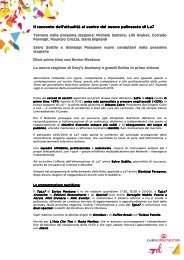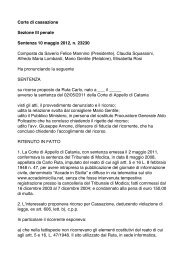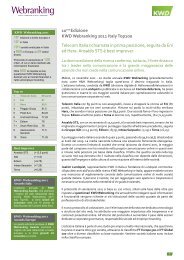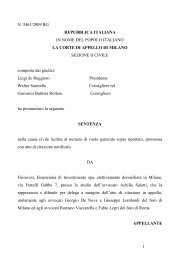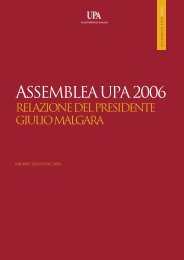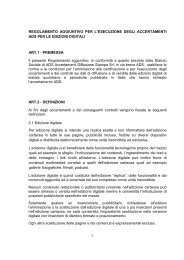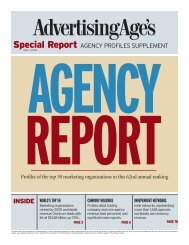What We Know About the Business of Digital Journalism
What We Know About the Business of Digital Journalism
What We Know About the Business of Digital Journalism
Create successful ePaper yourself
Turn your PDF publications into a flip-book with our unique Google optimized e-Paper software.
The Story So Far: <strong>What</strong> <strong>We</strong> <strong>Know</strong> <strong>About</strong> <strong>the</strong> <strong>Business</strong> <strong>of</strong> <strong>Digital</strong> <strong>Journalism</strong>Nobody involved has revealed <strong>the</strong> precise size <strong>of</strong> TBD’s losses. Saul Carlin, anAllbritton executive involved with TBD from <strong>the</strong> start, would say only that “trafficand revenue were being closely monitored. As a result, a change in managementwas necessary.”Brady says <strong>the</strong> picture was not that grim. The site had been budgeted to earnrevenue “in <strong>the</strong> low millions” in year one; he argues it was on track to reach perhaps75 percent <strong>of</strong> that goal. “The situation wasn’t great when I left, but it wasn’tcatastrophic ei<strong>the</strong>r,” he says.Mutter, a former journalist and media executive, took <strong>the</strong> shortfall as a demonstration<strong>of</strong> a fundamental misalignment between <strong>the</strong> expense <strong>of</strong> producinglocal reporting and <strong>the</strong> potential online revenue from it, because <strong>of</strong> <strong>the</strong> built-inconstraints <strong>of</strong> small audiences and puny ad rates. Various hyperlocal flameoutssupport this <strong>the</strong>sis: among o<strong>the</strong>rs, <strong>the</strong> Washington Post’s Loudoun Extra and <strong>the</strong>shuttered New York Times site for suburban New Jersey, whose audience washanded <strong>of</strong>f to local start-up Baristanet.Still, mistakes were made. Brady has said repeatedly that resistance from <strong>the</strong>site’s broadcast partner WJLA, <strong>the</strong> Allbritton-owned ABC affiliate in Washington,proved a major hurdle. Both Brady and Steve Buttry, TBD’s director <strong>of</strong> communityengagement, said <strong>the</strong> TV staff was unhappy to see its website rolled intoTBD.com—which linked out heavily to o<strong>the</strong>r media outlets—and that <strong>the</strong> stationfailed to promote TBD wholeheartedly on <strong>the</strong> air.“The first time we linked out to ano<strong>the</strong>r TV site, that was a major collision,”says Buttry. He adds that TBD linked out more moderately after that and gave <strong>the</strong>TV news staff a “heads-up” when it planned to point to a story that WJLA hadmissed. “The lesson from our experience is that <strong>the</strong> legacy culture is powerfuland ingrained,” he says. “Whenever its revenue stream might be endangered ordisrupted, it’s going to have a big influence on decisions.”The most important example <strong>of</strong> that influence was <strong>the</strong> decision to fold TBD’sad sales staff into WJLA’s, which led to <strong>the</strong> departure <strong>of</strong> <strong>the</strong> small digital salesteam that Brady had assembled. “Selling digital is hard. I was adamant that <strong>the</strong>only way to be successful was to keep <strong>the</strong> sales force separate,” he says. The tensionwas visible from <strong>the</strong> start, Brady adds; an example is an ambitious launch38





